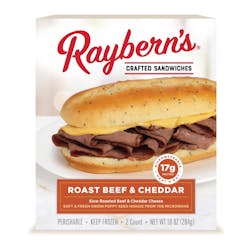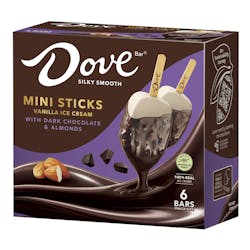Campbell Soup Co. reported its results for the first quarter of fiscal 2012.
Sales decreased 1 percent to $2.161 billion.
Solid earnings gains were made in U.S. Simple Meals, despite 3 percent sales decline.
Earnings declined in U.S. beverages and global baking and snacking.
Net earnings for the quarter ended Oct. 30, 2011, were $265 million, or $0.82 per share, compared with $279 million, or $0.82 per share, in the prior year.
Denise Morrison, Campbell’s president and CEO, said in a prepared statement, “As we’ve previously stated, fiscal 2012 will be a year of investment as we establish the foundation for the next era of profitable growth at Campbell.
"While it is early in this transition year, our efforts to stabilize U.S. Soup profitability are on track. As planned, we raised prices in response to inflation and reduced ineffective marketing spending, which led to improved profits despite anticipated volume declines. Specifically, we engaged in significantly less promotional spending. We also commenced our U.S. Soup advertising later in the quarter to coincide with the start of soup season. This is part of a planned, full-year timing shift of our media dollars into the soup season where they are most effective."
Morrison continued, “In U.S. Beverages, we faced increased inflation, a weaker category and intensified competition, with new entrants in both 100-percent vegetable juice and fruit and vegetable blends. We stepped up our advertising near the end of October, when our new ‘V8’campaign began airing. Although our consumption growth outpaced the category and our market share increased, this required significant investment to protect our business.
“We will increase investment in brand building and innovation programs this fiscal year. We’re encouraged by the speed to shelf of our new product innovations this quarter and our progress on the longer-term process of building a steady stream of consumer-driven innovation in our key businesses.”
Morrison concluded, “We’re making steady progress on implementing our new strategies. Our overall first-quarter performance was in line with our expectations, although the composition of our results was mixed. U.S. Simple Meals, Pepperidge Farm and North America foodservice met or exceeded expectations; U.S. Beverages and International did not. We have more hard work ahead, and we won’t rest until we change the growth trajectory of the company.”
As previously announced, fiscal 2012 will be a year of investment and transition for Campbell. The company confirmed its previous fiscal 2012 guidance. Campbell expects net sales growth to be between 0 and 2 percent, a decline in adjusted EBIT of between 9 and 7 percent and a decline in adjusted EPS of between 7 and 5 percent, or $2.35 to $2.42 per share, from the adjusted base of $2.54.
For the first quarter, sales decreased 1 percent to $2.161 billion. The change in sales for the quarter reflected the following factors:
- Volume and mix subtracted 5 percent;
- Price and sales allowances added 4 percent;
- Increased promotional spending subtracted 1 percent;
- Currency added 1 percent.
Gross margin was 39.5 percent, compared with 41.2 percent a year ago. The decrease in gross margin percentage was primarily due to cost inflation and negative mix, partly offset by higher selling prices and productivity improvements.
Marketing and selling expenses decreased 6 percent to $261 million compared with $277 million in the prior year, primarily due to lower advertising and consumer promotion expenses, principally in the U.S. Soup business, partly offset by the impact of currency. To increase its effectiveness, U.S. Soup advertising began later in the quarter to be more closely aligned with the start of the soup season.
Administrative expenses increased $5 million to $145 million, primarily due to higher incentive compensation and benefit costs, and the unfavorable impact of currency, partially offset by the benefit of cost savings from previously announced restructuring initiatives.
EBIT was $416 million compared with $444 million in the prior-year quarter. EBIT decreased 6 percent primarily due to cost inflation and lower volumes, partly offset by higher selling prices and productivity savings.
Net earnings per share were $0.82 in the current quarter, comparable to a year ago. Earnings per share benefited from a reduction in shares outstanding from the company’s share repurchase programs.
Cash flow from operations totaled $73 million in the quarter, an improvement of approximately $100 million from a year ago, due to lower pension contributions and lower working capital requirements.
Campbell repurchased 2.6 million shares for $85 million under its strategic share repurchase program announced in June 2011 and the company’s ongoing practice of buying back shares sufficient to offset those issued under incentive compensation plans.
Sales for U.S. Simple Meals were $874 million for the first quarter, a decrease of 3 percent compared to the year-ago period. A breakdown of the change in sales follows:
- Volume and mix subtracted 7 percent;
- Price and sales allowances added 5 percent;
- Increased promotional spending subtracted 1 percent.
U.S. Soup sales declined 4 percent as lower volumes were partly offset by higher selling prices. Sales volumes were negatively impacted by higher promoted and non-promoted price points at retail.
Sales of “Campbell’s” condensed soups decreased 4 percent, with declines in both eating and cooking varieties.
Sales of ready-to-serve soups decreased 9 percent, reflecting declines in both canned and microwavable soups.
Broth sales rose 6 percent, reflecting higher selling prices and volume gains.
Sales of “Prego” pasta sauce achieved volume-driven sales gains, while sales of “Pace” Mexican sauce declined slightly as the impact of increased promotional spending was partly offset by increased volumes.
Operating earnings were $260 million compared with $240 million in the prior-year period. The increase in operating earnings was primarily due to improved earnings performance in U.S. soup. U.S. soup operating earnings increased primarily due to higher selling prices and lower advertising and consumer promotion expenses, partially offset by volume declines. The U.S. soup advertising campaign was launched later in the quarter compared to a year ago.
Sales for global baking and snacking were $568 million for the first quarter, an increase of 4 percent from a year ago. The change in sales reflected the following factors:
- Volume and mix subtracted 3 percent;
- Price and sales allowances added 5 percent;
- Increased promotional spending subtracted 1 percent;
- Currency added 3 percent.
Sales of Pepperidge Farm increased 5 percent, reflecting higher selling prices across the portfolio.
In cookies and crackers, sales increases were driven by solid gains in “Goldfish” snack crackers and by the launch of “Cracker Chips” and “Milano Melts” cookies, partly offset by declines in Soft-Baked cookies.
Bakery sales increased due to gains in “Goldfish” breads.
Sales at Arnott’s increased primarily due to currency, partially offset by lower volumes. The volume performance was negatively impacted by an increase in promoted and non-promoted price points at retail and a weakening consumer environment in Australia.
Operating earnings were $88 million compared to $100 million in the prior year, primarily due to lower earnings at Arnott’s, reflecting the impact of cost inflation and lower volumes, partially offset by the favorable impact of currency.
Sales for international Simple Meals and beverages were $359 million for the first quarter, a decrease of 3 percent compared with a year ago. The change in sales reflected the following factors:
- Volume and mix subtracted 7 percent;
- Currency added 4 percent;
- Excluding the impact of currency, the sales decline was primarily due to the performance of the businesses in Canada and Europe.
In Canada, sales decreased primarily due to declines in soup, partially offset by the favorable impact of currency.
In Europe, sales decreased primarily due to volume declines in France and Germany, partly offset by gains in Belgium.
In the Asia Pacific region, sales increased due to the impact of currency and growth in Malaysia, partially offset by declines in Australia soup.
Operating earnings were $43 million compared with $51 million in the year-ago period. The decrease in operating earnings was primarily due to declines in Canada and the Asia Pacific region.
Sales for U.S. beverages were $198 million for the first quarter, a decrease of 3 percent compared to the year-ago period. A breakdown of the change in sales follows:
- Volume and mix added 1 percent;
- Increased promotional spending subtracted 4 percent
Sales of “V8” vegetable juice declined, while sales of both “V8 V-Fusion” juice and “V8 Splash” juice drinks increased. Sales of “V8 V-Fusion” juice benefited from the launch of “V8 V-Fusion Smoothies” in the quarter. In response to intensified competition and new entrants in both 100-percent vegetable juice and fruit and vegetable blends, the company increased promotional spending, primarily on “V8 V-Fusion” juice.
Operating earnings were $30 million compared with $55 million in the year-ago period. The decrease in operating earnings was primarily due to significant cost inflation and increased marketing spending, both in trade promotions and advertising.
North America foodservice sales were $162 million for the first quarter, an increase of 6 percent compared with a year ago. A breakdown of the change in sales follows:
- Volume and mix added 2 percent;
- Price and sales allowances added 3 percent;
- Decreased promotional spending added 1 percent
Sales increased primarily due to volume-driven gains in fresh chilled soup sold at retail.
Operating earnings increased to $27 million from $23 million. The increase in operating earnings was primarily driven by higher selling prices and productivity improvements, partly offset by cost inflation.




